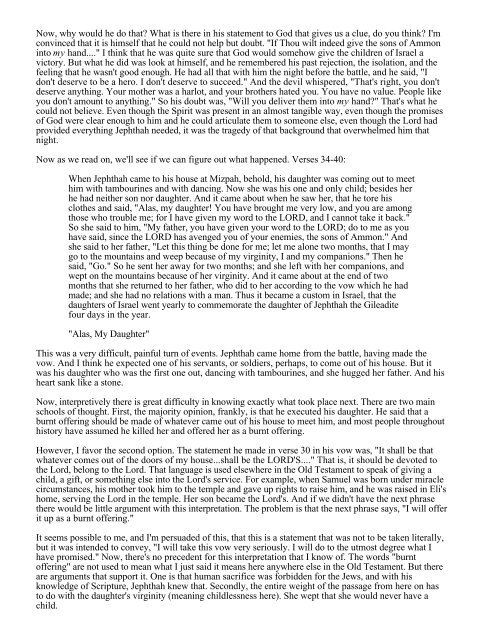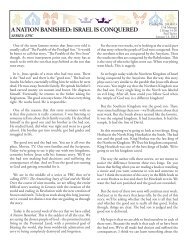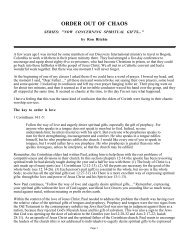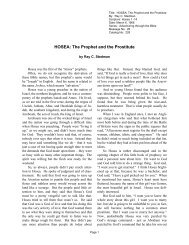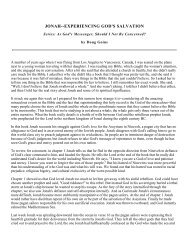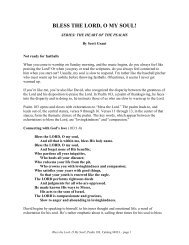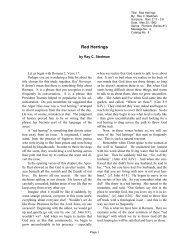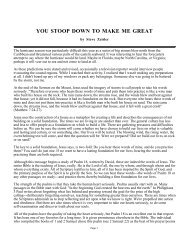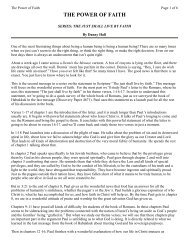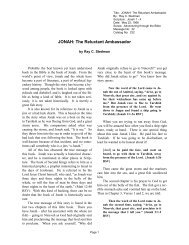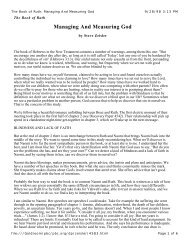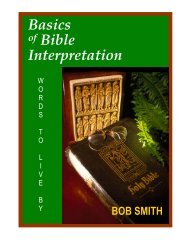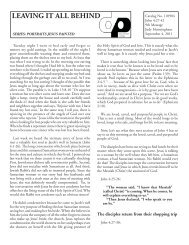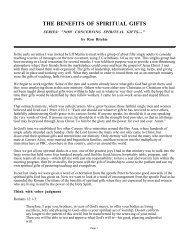FAILED FAMILIES, FAITH IN GOD - Peninsula Bible Church
FAILED FAMILIES, FAITH IN GOD - Peninsula Bible Church
FAILED FAMILIES, FAITH IN GOD - Peninsula Bible Church
You also want an ePaper? Increase the reach of your titles
YUMPU automatically turns print PDFs into web optimized ePapers that Google loves.
Now, why would he do that? What is there in his statement to God that gives us a clue, do you think? I'm<br />
convinced that it is himself that he could not help but doubt. "If Thou wilt indeed give the sons of Ammon<br />
into my hand...." I think that he was quite sure that God would somehow give the children of Israel a<br />
victory. But what he did was look at himself, and he remembered his past rejection, the isolation, and the<br />
feeling that he wasn't good enough. He had all that with him the night before the battle, and he said, "I<br />
don't deserve to be a hero. I don't deserve to succeed." And the devil whispered, "That's right, you don't<br />
deserve anything. Your mother was a harlot, and your brothers hated you. You have no value. People like<br />
you don't amount to anything." So his doubt was, "Will you deliver them into my hand?" That's what he<br />
could not believe. Even though the Spirit was present in an almost tangible way, even though the promises<br />
of God were clear enough to him and he could articulate them to someone else, even though the Lord had<br />
provided everything Jephthah needed, it was the tragedy of that background that overwhelmed him that<br />
night.<br />
Now as we read on, we'll see if we can figure out what happened. Verses 34-40:<br />
When Jephthah came to his house at Mizpah, behold, his daughter was coming out to meet<br />
him with tambourines and with dancing. Now she was his one and only child; besides her<br />
he had neither son nor daughter. And it came about when he saw her, that he tore his<br />
clothes and said, "Alas, my daughter! You have brought me very low, and you are among<br />
those who trouble me; for I have given my word to the LORD, and I cannot take it back."<br />
So she said to him, "My father, you have given your word to the LORD; do to me as you<br />
have said, since the LORD has avenged you of your enemies, the sons of Ammon." And<br />
she said to her father, "Let this thing be done for me; let me alone two months, that I may<br />
go to the mountains and weep because of my virginity, I and my companions." Then he<br />
said, "Go." So he sent her away for two months; and she left with her companions, and<br />
wept on the mountains because of her virginity. And it came about at the end of two<br />
months that she returned to her father, who did to her according to the vow which he had<br />
made; and she had no relations with a man. Thus it became a custom in Israel, that the<br />
daughters of Israel went yearly to commemorate the daughter of Jephthah the Gileadite<br />
four days in the year.<br />
"Alas, My Daughter"<br />
This was a very difficult, painful turn of events. Jephthah came home from the battle, having made the<br />
vow. And I think he expected one of his servants, or soldiers, perhaps, to come out of his house. But it<br />
was his daughter who was the first one out, dancing with tambourines, and she hugged her father. And his<br />
heart sank like a stone.<br />
Now, interpretively there is great difficulty in knowing exactly what took place next. There are two main<br />
schools of thought. First, the majority opinion, frankly, is that he executed his daughter. He said that a<br />
burnt offering should be made of whatever came out of his house to meet him, and most people throughout<br />
history have assumed he killed her and offered her as a burnt offering.<br />
However, I favor the second option. The statement he made in verse 30 in his vow was, "It shall be that<br />
whatever comes out of the doors of my house...shall be the LORD'S...." That is, it should be devoted to<br />
the Lord, belong to the Lord. That language is used elsewhere in the Old Testament to speak of giving a<br />
child, a gift, or something else into the Lord's service. For example, when Samuel was born under miracle<br />
circumstances, his mother took him to the temple and gave up rights to raise him, and he was raised in Eli's<br />
home, serving the Lord in the temple. Her son became the Lord's. And if we didn't have the next phrase<br />
there would be little argument with this interpretation. The problem is that the next phrase says, "I will offer<br />
it up as a burnt offering."<br />
It seems possible to me, and I'm persuaded of this, that this is a statement that was not to be taken literally,<br />
but it was intended to convey, "I will take this vow very seriously. I will do to the utmost degree what I<br />
have promised." Now, there's no precedent for this interpretation that I know of. The words "burnt<br />
offering" are not used to mean what I just said it means here anywhere else in the Old Testament. But there<br />
are arguments that support it. One is that human sacrifice was forbidden for the Jews, and with his<br />
knowledge of Scripture, Jephthah knew that. Secondly, the entire weight of the passage from here on has<br />
to do with the daughter's virginity (meaning childlessness here). She wept that she would never have a<br />
child.


